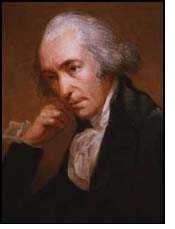James Watt
Scottish instrument maker and inventor, b. 19 January 1736 (Greenock, Scotland), d. 25 August 1819 (Birmingham, England).
 James Watt was the son of a successful businessman in the ship- and housebuilding trade, who was the treasurer and magistrate of Greenock, Renfrewshire. He was educated in the classics (Latin and Greek) and in mathematics at high school, but his father's workshop became the major source of his inspiration, where the young James spent his leisure time making models of machines, organs and other mechanical devices.
James Watt was the son of a successful businessman in the ship- and housebuilding trade, who was the treasurer and magistrate of Greenock, Renfrewshire. He was educated in the classics (Latin and Greek) and in mathematics at high school, but his father's workshop became the major source of his inspiration, where the young James spent his leisure time making models of machines, organs and other mechanical devices.
At the age of 17 Watt, who wanted to become an instrument maker, went to Glasgow and then to London, where he entered an apprenticeship. Finding London difficult for his health he returned to Glasgow to open his own shop for mathematical instruments in the university in 1757.
In 1764 Watt was given a steam engine for repairs. At the university he had met several scientists and had a good understanding of latent heat (heat stored in steam and released on condensation). The steam engine he was asked to repair was quite wasteful in that respect, since it lost all latent heat after the steam power was used to drive the piston. A year later Watt had come up with his first major improvement of the steam engine: the separate condenser, where the latent heat is recovered and returned for use in the engine. He built his first improved steam engine in partnership with John Roebuck, and in 1769 he took out his famous patent "A New Invented Method of Lessening the Consumption of Steam and Fuel in Fire Engines."
The next years saw Watt employed as a surveyor, assisting in the building of canals. When John Roebuck went bankrupt in 1872, a share of Watt's patent was obtained by Matthew Boulton, an industrialist from Birmingham; so in 1774 Watt moved to Birmingham and, after his patent was extended by an act of Parliament, entered into a partnership with Boulton in 1775.
During the next five years Watt engines were installed in the mines of Cornwall, England. These engines were used for pumping water and used a piston with back-and-forth motion. Soon after 1780 Watt improved the steam engine to such an extent that he is often erroneously considered to be the inventor of the steam engine itself.
- In 1781 he invented the sun-and-planet gear, through which the reciprocating piston motion was converted into rotation. This opened new applications in corn and cotton mills and many other industries.
- In 1782 he patented the double-action engine, in which steam is admitted alternately into both ends of the cylinder so that the piston is pushed in both directions.
- In 1784 he invented the parallel motion, which allows the piston to always move along the axis of the cylinder.
- In 1788 he invented the centrifugal or flyball governor, which allows automatic control of the engine's speed.
- In 1790 he completed the "Watt engine" by inventing the pressure gauge to monitor steam pressure.
Watt became a very wealthy man and was able to retire when his patent expired in 1800. Watt and Boulton were elected fellows of the Royal Society in 1785. In 1806 he received a doctorate in law from the University of Glasgow. The French Académie des Sciences made him a foreign associate in 1814. The international unit of power watt is named in his honour. (Watt himself measured power in horsepower and compared his machines to the pulling power of a horse.)
home
 James Watt was the son of a successful businessman in the ship- and housebuilding trade, who was the treasurer and magistrate of Greenock, Renfrewshire. He was educated in the classics (Latin and Greek) and in mathematics at high school, but his father's workshop became the major source of his inspiration, where the young James spent his leisure time making models of machines, organs and other mechanical devices.
James Watt was the son of a successful businessman in the ship- and housebuilding trade, who was the treasurer and magistrate of Greenock, Renfrewshire. He was educated in the classics (Latin and Greek) and in mathematics at high school, but his father's workshop became the major source of his inspiration, where the young James spent his leisure time making models of machines, organs and other mechanical devices.